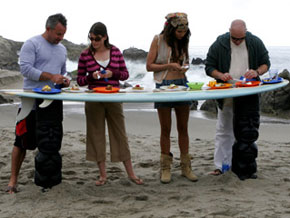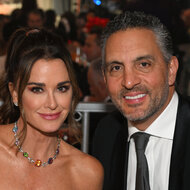
Create a free profile to get unlimited access to exclusive videos, sweepstakes, and more!
Breakfast Of Champions
Tom Colicchio's thoughts on why Frank blew the breakfast challenge.

I get a kick out of the notion that our producers manipulate the action on Top Chef in order to create drama. The truth is they don't need to. For one thing, by now our remaining chefs may look fine, but appearances are deceiving. The weeks of very long hours and too little sleep are taking their toll. I know what you're thinking: Big deal, I work long hours, too, and I'm no drama king/queen. But a number of other factors are starting to push the group towards the edge. For one, they have been removed from their usual support networks of spouses and loved ones and are thrust into very close living quarters with virtual strangers. In addition to the stress of having their work judged, they are also subject to the unending scrutiny of cameras and crew (except for bathroom jaunts) which creates its own form of performance anxiety. 
The chefs have few pressure outlets; they're allowed limited internet access in order to research food, but they aren't allowed to disappear for a long walk, or hole themselves away with headphones, etc. since the show depends upon their engaging with one another. They can't even listen to music, since this would interfere with recording dialogue! One of the only ways the chefs can blow off steam is by drinking -- which only contributes to the exhaustion. To top it all off, they have been, by necessity, divested of their money to discourage independent forays out into the world and are kept isolated from other people (except the judges, crew, and the people they feed) which gives their world a surreal, hermetic quality.
Is it any wonder that they flip out when someone touches their toothbrush? But the most obvious effect of all the stress and exhaustion is that it seems to compromise the chefs' chief asset -- their imagination. That amorphous place from whence springs ideas, inspiration, solutions, sense memory, and innovation. True imagination can be nurtured, but not taught. It can manifest through an intuitive understanding of how to juxtapose taste and texture, or through wild flights of fancy. Some chefs' imaginations give them a unique understanding of the emotional value of food -- the way in which it can provoke or comfort. For others, imagination leads them into arch, whimsical interpretations of culinary classics. Regardless, when people get stressed out and tired, imagination is often the first thing to go.
The result of this is a tendency towards inflexibility, an inability to adapt or handle curveballs. This was definitely the case when we brought the chefs to the beach in Malibu. After too little sleep, and without a chance to psychologically gear up for the challenge of cooking over a fire pit, some of the chefs' imaginations simply shut down. Frank was perhaps the best example of this -- he had planned to bake a quiche, which was impossible over an open flame, and he lacked the ability to recover in style. Sam, with his (burnt) toad-in-the-hole eggs and bagel combination seemed more rattled by the lack of sleep than the fire-pit, but the result was the same. Cliff was thrown by the environment enough that he got sloppy -- of all the food prepared, his was the only dish that featured sand as an ingredient. So many of my previous blogs have rambled on about a chef's need to adapt that I'm not going to go there today. But I will bring up a quick anecdote to illustrate how a chef can use imagination to override a difficult situation:
About eight years ago, I donated a private, home-cooked dinner party to a charity auction. A very social New Jersey woman cast the winning bid, and we made arrangements for me and a couple of my cooks to come to her house and prepare an elegant tasting menu for twenty or so of her close friends. The day of the event we carefully prepped the ingredients and packed them, in the middle of a torrential rainstorm, into my truck. En route to the party the turnpike flooded, causing a number of cars to spin out of control and skid off the road. Entire swaths of highway were shut down and rerouted, and the result was total gridlock. Although we had left extra early, it made no difference -- we were stuck, so I called our hostess to explain. At first she was calm about it, but soon she was calling me every few minutes, increasingly hysterical, as her guests started to arrive and we still weren't there. When we finally pulled up at the woman's house my cooks and I immediately kicked into high gear. We skipped the hors-d'oeuvres and plowed right into dinner, churning out the first two courses, while the hostess grew steadily calmer. Soon the guests were happily enjoying the food and all was forgiven. We prepared to launch into our third course -- a spectacular lobster with green onion chutney -- when suddenly we realized we had a problem: No lobster. Somehow we'd left it behind in the restaurant.
I exchanged a look with Johnny Schaeffer, my long-time right-hand at Gramercy Tavern, and without a beat, we got to work. We reached into our unused prep for hors-d'oeuvres and pulled out a lobe of foie-gras. We quickly roasted it off in tasting portions and plated it with the original green onion chutney which we turned into a sauce that nicely cut the unctuousness of the liver. We tasted and seasoned as we went, and reworked the presentation so that it made sense with the new dish. The course was a hit, and our hostess came back into the kitchen to compliment us before rejoining her guests and getting good and drunk. I mention this not to toot my own horn (though Johnny deserves some credit for unflappability) but to illustrate just how important it is not to be locked into one single idea when cooking. When I teach cooking classes, I always ask my students to put down their pencils and papers (they hate this) because if I've done my job well they will be able to replicate the dish I'm about to teach with just about any ingredient they like. I am teaching techniques, not recipes, and I want them to substitute the elements that they most enjoy when the time comes to cook on their own. Not a salmon lover? Use sea bass instead -- the important thing is not the fish, but to know how to test for doneness. In other words, I refuse to let them shut down their own imaginations and take safe harbor in a single, fixed recipe.


Of all the cooks, Mia seemed most comfortable with the setting (as she reminded us, she used to cook for cowboys,) and Elia and Betty also did a good job making their dishes work on the fire pit. All three made sure that their presentations were clean and attractive, which made the dishes even easier to appreciate. Mia's Crab Cake Benedict seemed to be the surfer's favorite, Elia pulled off an unusual combination of sweet and salty flavors with her waffle and eggs, and Betty surprised us all by managing to cook the eggs in her egg/ham/leek bundle like the delicate ingredients that they are; unlike some of the others, she didn't resort to a mindless scramble, but kept the egg yolks intact, and then cooked them gently and perfectly. 

Elia's dish was Guest Judge Raphael Lunetta's choice for winner. Interestingly, this was one of the few occasions this season when Elia didn't take issue with the judge's opinion. With the exception of Mike and Marcel, the remaining chefs made mistakes with their eggs -- overcooking them, or presenting them in visually unappealing ways. The eggs in Ilan's Spanish tortilla dish were a bit brown for my taste, but he was saved by the rest of his dish, which tasted great. As I mentioned earlier, Sam and Cliff weren't so lucky. 
But it was Frank who really blew it. If he could have let go of his quiche idea, he would have realized he had all the ingredients for a great frittata, easily pulled off in a pan over the open fire. Instead he opted for a zucchini salmon scramble, but his distraction got in the way of good technique and his eggs were way overcooked. The little side of cannoli cream with strawberries tasted good, but wasn't connected in any way to the larger dish -- I would have rather seen him put al his focus into getting the eggs right. Of all the misses, his was the worst, and on that basis the judges chose to let him go.

Frank was a good guy, and I know most of the other chefs were sad to see him go. Frank's got plenty of ambition, experience and heart, and I wish him well. I'm sure he'll be a success in whatever culinary venture he undertakes ... just so long as no one messes with his toothbrush.


